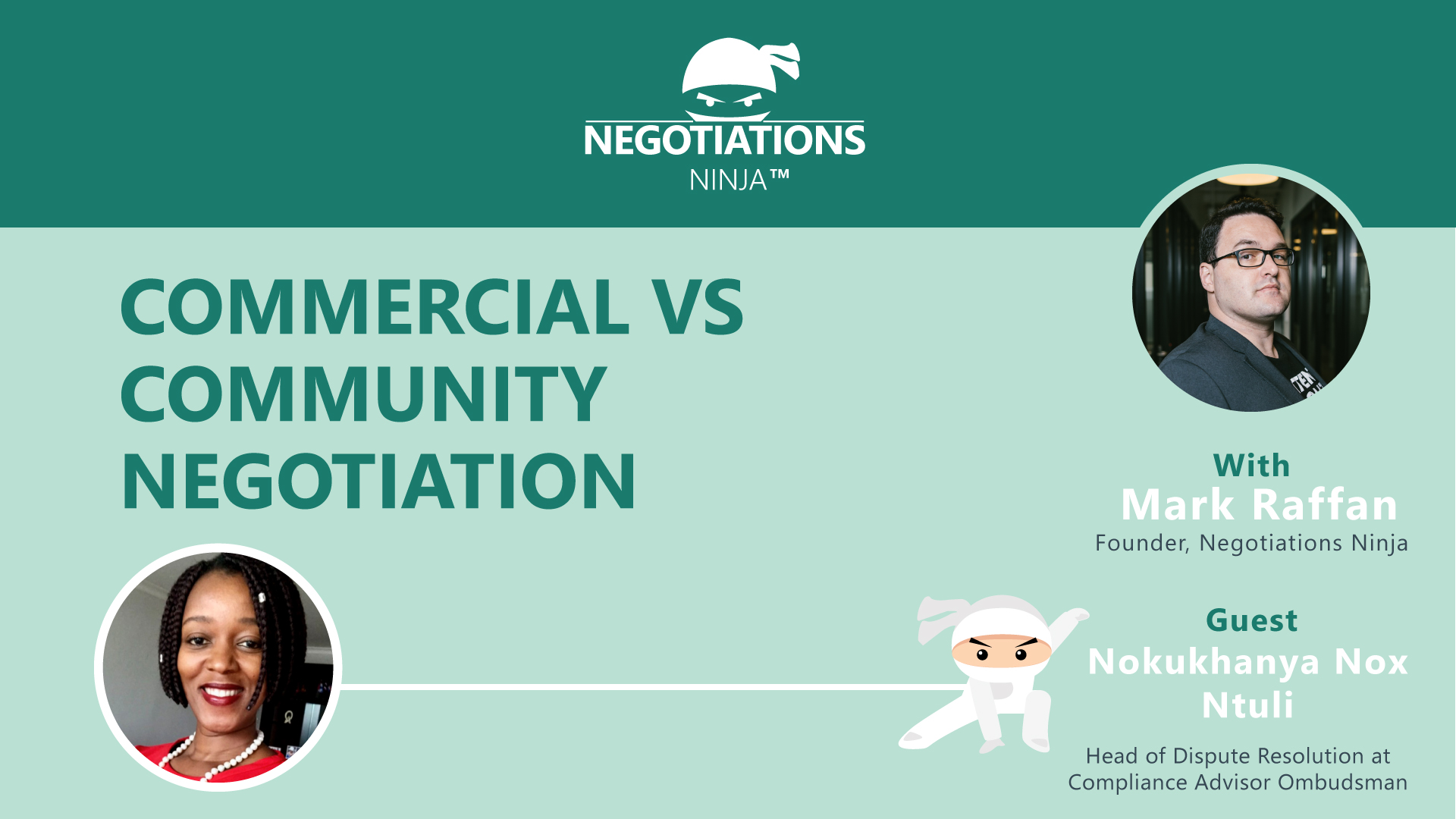Multiparty and multi-stakeholder negotiations are complex. Community negotiation is even more so. The process is mind-boggling. And it’s one that Nokukhanya (Nox) Ntuli navigates regularly. Nox is a South African lawyer, mediator, process facilitator, and the Head of Dispute Resolution at Compliance Advisor Ombudsman, part of the World Bank Group.
Her role is an accountability mechanism within the World Bank Group. Its purpose is to accept complaints from communities that feel negatively affected by its investments. Nox mediates those disputes. She shares what this unique community negotiation looks like in this episode of Negotiations Ninja!
Outline of This Episode
- [2:35] Learn more about Nokukhanya Nox Ntuli
- [3:50] Nox’s experience(s) in conflict-ridden countries
- [6:06] The importance of understanding cultural nuance
- [9:37] How commercial disputes are different
- [14:00] Reaching a desired outcome in a community negotiation
- [18:38] Why a company might find itself in mediation
- [21:12] How Nox navigates back-channel negotiations
- [23:03] Using back-channel negotiations to fuel conflict
- [26:33] What’s happening next for Nox Ntuli
The importance of understanding cultural nuance
Nox is currently part of a community negotiation in New Guinea, where the people are primarily Muslim. People will become anxious, uncomfortable, and disengaged if you don’t consider their cultural nuances. So when she crafted the process, she designed it to take into consideration their prayer times, when they must go to the mosque, dietary preferences, etc.
Look at the mediation process to understand how people can react to the things you may not be taking into account (and may have nothing to do with the conflict). For example, it’s considered disrespectful if you don’t provide halal food. Things like this can impact every part of the process.
Nox also points out that time is irrelevant in remote areas and villages. If a meeting is at 9, people may arrive at 10. It is up to you to adjust.
People are easily offended when they feel disrespected. They will posture, throw in ultimatums, etc. You have to be sensitive to cultural nuances when you’re trying to build a relationship, or things can be taken in the wrong way.
How commercial disputes are different
When Nox worked in Uganda as a commercial mediator, she was involved in a tax case (in which she has no experience). One side was the revenue service, and the other was a phone company. They were contesting what the phone company owed the revenue service.
Nox told them she didn’t understand tax law, so she asked them to explain the problem and how they came to the calculation. They were both using different formulas. So she told each side to research their calculations. Ultimately, they reached a consensus about the formula and were able to move forward.
So what was the difference? Their attitude. They had both decided they were correct and wanted to move through the process quickly. But when you’re dealing with a community dispute, background is important.
If a hydropower project has displaced people, they want you to know their background. It takes time to articulate. If you’re used to commercial work, you must mentally adjust because everything takes much longer.
Secondly, these communities care about resolving things collectively so everyone can benefit. You need to see them as people. In commercial spaces, the people aren’t the primary concern in the resolution.
Reaching a desired outcome in a community negotiation
Some people want to receive compensation and be done. Because the company will continue to exist alongside the community, most people have a major interest in resolution and creating a respectful ongoing working relationship beneficial to both parties.
When mediating, you have to navigate the perceived power imbalances on both sides. The community often feels that the investing company is wealthy, well-connected, and supported by the government and financial institutions.
Conversely, the company can feel that they’re losing face when they have to enter a mediation. So, they focus on the legal angle, which can often offend the other side.
So, Nox spends time educating both sides on how the process will work. She’ll also focus on building some level of trust, so if either side is uncomfortable, they’ll share their concerns with her.
Why a company might find itself in mediation
Private sector companies are going into communities to get the community familiarized with the project and its benefits. But companies aren’t in the business of stakeholder engagement. They don’t always understand the importance of ongoing communication. It’s both time-consuming and challenging, and they can’t always continue.
Many times, the company isn’t originally from the country they’re mediating with. If they are from the same country, there’s a level of disappointment from the community. They don’t understand why someone who should “Know better” is treating them a certain way.
There is a lot of emotion involved in these conversations. That’s why a focus on the people is important. They all want to be seen and heard. In this episode, Nox shares more about how she connects with people and navigates the community negotiation process. Don’t miss it!
Connect with Nox Ntuli
- Compliance Advisor Ombudsman (CAO)
- Connect on LinkedIn
- Follow on Twitter
Connect With Mark
- Follow Negotiations Ninja on Twitter: @NegotiationPod
- Connect with Mark on LinkedIn
- Follow Negotiations Ninja on LinkedIn
- Connect on Instagram: @NegotiationPod




